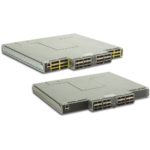Setting up an environment for High Performance Computing (HPC) especially using GPUs can be daunting. There can be multiple dependencies, a number of supporting libraries required, and complex installation instructions. NVIDIA has made this easier with the announcement and release of HPC Application Containers with the NVIDIA GPU Cloud.
Video: State of Containers and the Convergence of HPC and BigData
Christian Kniep from Docker Inc gave this talk at the 2018 Swiss HPC Conference. “This talk will recap the history of and what constitutes Linux Containers, before laying out how the technology is employed by various engines and what problems these engines have to solve. Afterward Christian will elaborate on why the advent of standards for images and runtimes moved the discussion from building and distributing containers to orchestrating containerized applications at scale. In conclusion attendees will get an update on how containers foster the convergence of Big Data and HPC workloads and the state of native HPC containers.”
New Mellanox Onyx Ethernet Network Operating System boosts Devops
Today Mellanox announced the release of Mellanox Onyx – the industry-leading open and flexible Ethernet Network Operating System for Mellanox Spectrum Open Ethernet switches. “Mellanox Onyx offers a mature Layer-3 feature-set, with integrated support for standard Devops tools, allowing customers to run third party containerized applications with complete SDK access. By utilizing Mellanox Onyx’s leading capabilities, our customers can enjoy the benefits of an industry-standard Layer-2 and Layer3 feature-set along with the ability to customize and optimize the network to their specific needs.”
Video: The Marriage of Cloud, HPC and Containers
Adam Huffman from the Francis Crick Institute gave this talk at FOSDEM’17. “We will present experiences of supporting HPC/HTC workloads on private cloud resources, with ideas for how to do this better and description of trends for non-traditionalHPC resource provision. I will discuss my work as part of the Operations Team for the eMedLab private cloud, which is a large-scale (6000-core, 5PB)biomedical research cloud using HPC hardware, aiming to support HPC workloads.”
Building Containers for Intel Omni-Path Fabrics using Docker and Singularity
The Intel® OPA technology is designed to leverage the existing Linux* RDMA kernel and networking stack interfaces. As such, many HPC applications designed to run on RDMA networks can run unmodified on compute nodes with Intel® OPA network technology installed, benefitting from improved network performance. When these HPC applications are run in containers, using techniques described in this application note, these same Linux* RDMA kernel device and networking stack interfaces can be selectively exposed to the containerized applications, enabling them to take advantage of the improved network performance of the Intel® OPA technology.
RCE Podcast Looks at Shifter Containers for HPC
In this RCE Podcast, Brock Palen and Jeff Squyres speak with Shane Canon and Doug Jacobsen from NERSC, the authors of Shifter. “Shifter is a prototype implementation that NERSC is developing and experimenting with as a scalable way of deploying containers in an HPC environment. It works by converting user or staff generated images in Docker, Virtual Machines, or CHOS (another method for delivering flexible environments) to a common format.”
Penguin Computing Adds Support for Singularity Containers on POD HPC Cloud
Today Penguin Computing announced support for Singularity containers on its Penguin Computing On-Demand (POD) HPC Cloud and Scyld ClusterWare HPC management software. “Our researchers are excited about using Singularity on POD,” said Jon McNally, Chief HPC Architect at ASU Research Computing. “Portability and the ability to reproduce an environment is key to peer reviewed research. Unlike other container technologies, Singularity allows them to run at speed and scale.”
Greg Kurtzer of LBNL Launches SingularityWare, LLC
Over at the Singularity Blog, Greg Kurtzer writes that he has created a new organization, SingularityWare, LLC. In partnership with RStor, the new company will be dedicated to further developing Singularity, supporting the associated open source community and growing the project. “In addition to continuing my leadership of Singularity (and the new LLC), I will be maintaining my association with Lawrence Berkeley National Laboratory, as a scientific advisor as well as continuing other efforts I am associated with (e.g. Warewulf and OpenHPC).”
Univa Manages Enterprise Container Workloads on Kubernetes Distros
Today Univa announced Navops Command, a ground breaking software suite that implements sophisticated workload placement and advanced policy management for enterprises to take full advantage of containers on any Kubernetes distribution.
How Containers will Enable Ubiquitous CAE as a Common Tool for Every Engineer
Over at the UberCloud, Wolfgang Gentzsch writes that, despite the ever increasing complexity of CAE tools, hardware, and system components engineers have never been this close to ubiquitous CAE as a common tool for every engineer.












